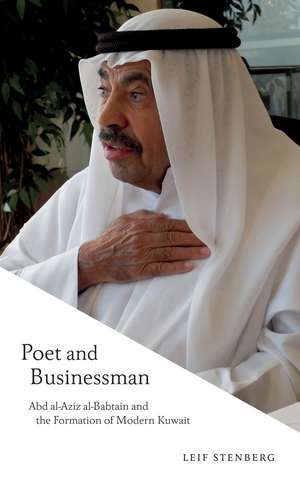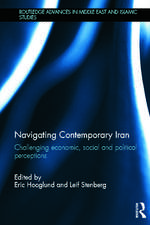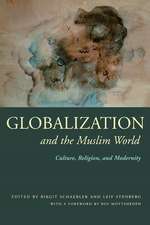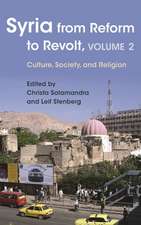Poet and Businessman: Abd al-Aziz al-Babtain and the Formation of Modern Kuwait
Autor Leif Stenbergen Limba Engleză Paperback – 16 mai 2023
This book reviews and analyzes the modern history of Kuwait through the life of Abd al-Aziz Sa‘ud al-Babtain, a wealthy businessman, philanthropist, and poet. He is the head of a large, influential international cultural foundation based in Kuwait City. Abd al-Aziz’s life story tightly interweaves with modern discussions on the history of the state of Kuwait. There are very few books taking a collective grip on the history of the state of Kuwait. Likewise, there are very few studies about the generation of Gulf individuals who experienced, benefitted from, and even suffered from the discovery of oil, and who has been a crucial part of socioeconomic and cultural developments in countries like Kuwait in recent history. By constructing a cohesive overview of the modern history of Kuwait enriched by the life of an individual that has lived through the better part of that particular history, this book fills a lacuna in contemporary scholarship on the Middle East, and especially the Arabian or the Persian Gulf.
Preț: 125.64 lei
Preț vechi: 135.83 lei
-8% Nou
Puncte Express: 188
Preț estimativ în valută:
24.04€ • 26.11$ • 20.20£
24.04€ • 26.11$ • 20.20£
Carte disponibilă
Livrare economică 01-15 aprilie
Livrare express 18-22 martie pentru 36.99 lei
Preluare comenzi: 021 569.72.76
Specificații
ISBN-13: 9781914983009
ISBN-10: 1914983009
Pagini: 304
Ilustrații: 12 halftones
Dimensiuni: 140 x 216 x 36 mm
Greutate: 0.41 kg
Editura: Gingko
Colecția Gingko
ISBN-10: 1914983009
Pagini: 304
Ilustrații: 12 halftones
Dimensiuni: 140 x 216 x 36 mm
Greutate: 0.41 kg
Editura: Gingko
Colecția Gingko
Notă biografică
Leif Stenberg is dean of Aga Khan University’s Institute for the Study of Muslim Civilizations. He is the editor of numerous volumes, including Syria from Reform to Revolt Vol. II: Culture, Society and Religion and Navigating Contemporary Iran: Challenging Economic, Social and Political Perceptions.
Cuprins
Acknowledgements
Chapter 1 The state of Kuwait and Abd al-Aziz Sa‘ud al-Babtain
•Abd al-Aziz Abu Sa‘ud al-Babtain – businessman and poet
•Introducing Kuwait, the life of al-Babtain and the al-Babtain Foundation
•The Iraqi invasion of Kuwait and identity insecurity
•The National Assembly and the politics of citizenship: gender, statelessness and tribal traditions
•A second war in the Gulf
•Studying Kuwait and Abd al-Aziz Abu Sa‘ud al-Babtain
Chapter 2 Arab, tribe, desert, and oil - background and key themes
•The notion of being Arab
•Tribal history and Kuwait established
•Escape from the Najd
•Desert, depression, and downturn
•The game-changing discovery of oil - the opportunity of entrepreneurship
Chapter 3 – Setting the scene; the founding of modern Kuwait
•Early years of the oil industry; political and economic shifts
•Property, the State, Islam, and Arabism
•The emergence of the State of Kuwait: shaykhs Mubarak through Abd Allah
•Transformed by wealth: changes for government and citizens alike
Chapter 4 – Kuwait on the way up: The world of al-Babtain
•A fertile business environment
•The financial services rush
•A society in flux: Citizenship laws, limitations, difference, and identity
•A loss of heritage? Kuwaiti culture and the diwaniyya
•Crafting Kuwaiti citizens – the rise of a welfare state for nationals
•Developing a Healthcare
•From local to global media
•Education – schooling the modern Kuwaiti
Chapter 5 – Kuwait experiencing challenges: The success of al-Babtain
•1960s boom and 1970s chaos: the desire to diversify and industrialize
•Speculation and the nouveau riche
•Crash and aftermath
•War in the Gulf
•A state on its knees, and an exodus
•The international community and an end to the war
Chapter 6 – Contemporary Kuwait and an expanding al-Babtain Foundation
•Developments after the liberation of Kuwait
•Economic recovery after the Gulf wars
•Striving to become a major financial centre
•The al-Babtain Foundation: aid programmes, and foreign policy
•Kuwaiti politics and uprisings in the Middle East
•Politics, Islamists, and the quest for democratisation
•Demography and the migrant workers
•Women in the Kuwaiti society – political participation
Chapter 7 - The Poet and the Businessman Abd al-Aziz al-Babtain – thinking about a life of continuity and change
•Abd al-Aziz, Kuwait, and the first scholarships
•Expanding al-Babtain Foundation
•The library, changing ambitions, and the “dialogue of civilisations”
•The al-Babtain Foundation and media
•The ambition to Advance a culture of peace and influencing new generations
•Poetry, Arab culture, Islam, identity politics, and nationalism
Chapter 8 – Final reflections
Bibliography
Chapter 1 The state of Kuwait and Abd al-Aziz Sa‘ud al-Babtain
•Abd al-Aziz Abu Sa‘ud al-Babtain – businessman and poet
•Introducing Kuwait, the life of al-Babtain and the al-Babtain Foundation
•The Iraqi invasion of Kuwait and identity insecurity
•The National Assembly and the politics of citizenship: gender, statelessness and tribal traditions
•A second war in the Gulf
•Studying Kuwait and Abd al-Aziz Abu Sa‘ud al-Babtain
Chapter 2 Arab, tribe, desert, and oil - background and key themes
•The notion of being Arab
•Tribal history and Kuwait established
•Escape from the Najd
•Desert, depression, and downturn
•The game-changing discovery of oil - the opportunity of entrepreneurship
Chapter 3 – Setting the scene; the founding of modern Kuwait
•Early years of the oil industry; political and economic shifts
•Property, the State, Islam, and Arabism
•The emergence of the State of Kuwait: shaykhs Mubarak through Abd Allah
•Transformed by wealth: changes for government and citizens alike
Chapter 4 – Kuwait on the way up: The world of al-Babtain
•A fertile business environment
•The financial services rush
•A society in flux: Citizenship laws, limitations, difference, and identity
•A loss of heritage? Kuwaiti culture and the diwaniyya
•Crafting Kuwaiti citizens – the rise of a welfare state for nationals
•Developing a Healthcare
•From local to global media
•Education – schooling the modern Kuwaiti
Chapter 5 – Kuwait experiencing challenges: The success of al-Babtain
•1960s boom and 1970s chaos: the desire to diversify and industrialize
•Speculation and the nouveau riche
•Crash and aftermath
•War in the Gulf
•A state on its knees, and an exodus
•The international community and an end to the war
Chapter 6 – Contemporary Kuwait and an expanding al-Babtain Foundation
•Developments after the liberation of Kuwait
•Economic recovery after the Gulf wars
•Striving to become a major financial centre
•The al-Babtain Foundation: aid programmes, and foreign policy
•Kuwaiti politics and uprisings in the Middle East
•Politics, Islamists, and the quest for democratisation
•Demography and the migrant workers
•Women in the Kuwaiti society – political participation
Chapter 7 - The Poet and the Businessman Abd al-Aziz al-Babtain – thinking about a life of continuity and change
•Abd al-Aziz, Kuwait, and the first scholarships
•Expanding al-Babtain Foundation
•The library, changing ambitions, and the “dialogue of civilisations”
•The al-Babtain Foundation and media
•The ambition to Advance a culture of peace and influencing new generations
•Poetry, Arab culture, Islam, identity politics, and nationalism
Chapter 8 – Final reflections
Bibliography





















